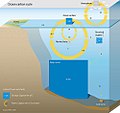The arsenic (As) cycle is the biogeochemical cycle of natural and anthropogenic exchanges of arsenic terms through the atmosphere, lithosphere, pedosphere...
8 KB (870 words) - 17:07, 23 February 2024
climate cycle Age of the Earth – Aluminum cycle – Arsenic cycle – Boron cycle – Bromine cycle – Cadmium cycle – Calcium cycle – Carbonate–silicate cycle – Chlorine...
9 KB (633 words) - 10:26, 28 September 2024
Arsenic is a chemical element with the symbol As and the atomic number 33. It is a metalloid and one of the pnictogens, and therefore shares many properties...
131 KB (14,402 words) - 03:07, 30 October 2024
The water cycle (or hydrologic cycle or hydrological cycle) is a biogeochemical cycle that involves the continuous movement of water on, above and below...
37 KB (4,703 words) - 10:33, 21 November 2024
Arsenic poisoning (or arsenicosis) is a medical condition that occurs due to elevated levels of arsenic in the body. If arsenic poisoning occurs over...
80 KB (9,472 words) - 21:55, 11 November 2024
The nitrogen cycle is the biogeochemical cycle by which nitrogen is converted into multiple chemical forms as it circulates among atmospheric, terrestrial...
57 KB (6,225 words) - 11:08, 30 October 2024
The phosphorus cycle is the biogeochemical cycle that involves the movement of phosphorus through the lithosphere, hydrosphere, and biosphere. Unlike...
41 KB (4,508 words) - 13:01, 2 November 2024
biogeochemical cycles include the carbon cycle, the nitrogen cycle and the water cycle. In each cycle, the chemical element or molecule is transformed and cycled by...
54 KB (5,566 words) - 08:07, 8 July 2024
arsenic, part of the arsenic cycle from groundwater, waterways, into oceans and back to land. There are methods to process and greatly reduce arsenic...
36 KB (3,615 words) - 15:41, 22 October 2024
Arsenic biochemistry refers to biochemical processes that can use arsenic or its compounds, such as arsenate. Arsenic is a moderately abundant element...
45 KB (5,276 words) - 07:27, 29 October 2024
The ozone–oxygen cycle is the process by which ozone is continually regenerated in Earth's stratosphere, converting ultraviolet radiation (UV) into heat...
14 KB (1,796 words) - 17:23, 18 October 2024
San Francisco Chronicle. letter Oremland, R., et al., "A Microbial Arsenic Cycle in a Salt-Saturated, Extreme Environment", Science, Vol. 308. no. 5726...
11 KB (1,174 words) - 19:45, 3 August 2024
The important sulfur cycle is a biogeochemical cycle in which the sulfur moves between rocks, waterways and living systems. It is important in geology...
61 KB (7,395 words) - 23:39, 3 November 2024
The carbonate–silicate geochemical cycle, also known as the inorganic carbon cycle, describes the long-term transformation of silicate rocks to carbonate...
22 KB (2,588 words) - 00:13, 31 October 2024
An integrated gasification combined cycle (IGCC) is a technology using a high pressure gasifier to turn coal and other carbon based fuels into pressurized...
33 KB (4,283 words) - 14:14, 8 September 2024
Organoarsenic chemistry (redirect from Organic arsenic)
chemistry is the chemistry of compounds containing a chemical bond between arsenic and carbon. A few organoarsenic compounds, also called "organoarsenicals...
17 KB (1,789 words) - 18:36, 11 September 2024
The iron cycle (Fe) is the biogeochemical cycle of iron through the atmosphere, hydrosphere, biosphere and lithosphere. While Fe is highly abundant in...
25 KB (2,818 words) - 16:52, 16 October 2024
Nitrification (category Nitrogen cycle)
intermediary nitrite. Nitrification is an important step in the nitrogen cycle in soil. The process of complete nitrification may occur through separate...
42 KB (4,990 words) - 22:26, 29 October 2024
The calcium cycle is a transfer of calcium between dissolved and solid phases. There is a continuous supply of calcium ions into waterways from rocks...
25 KB (2,993 words) - 18:54, 28 December 2023
nutrients is cyclic. Mineral cycles include the carbon cycle, sulfur cycle, nitrogen cycle, water cycle, phosphorus cycle, oxygen cycle, among others that continually...
51 KB (5,269 words) - 10:59, 27 August 2024
The hydrogen cycle consists of hydrogen exchanges between biotic (living) and abiotic (non-living) sources and sinks of hydrogen-containing compounds...
13 KB (1,403 words) - 16:39, 16 October 2024
The mercury cycle is a biogeochemical cycle influenced by natural and anthropogenic processes that transform mercury through multiple chemical forms and...
11 KB (1,149 words) - 00:12, 17 November 2024
The oceanic carbon cycle (or marine carbon cycle) is composed of processes that exchange carbon between various pools within the ocean as well as between...
60 KB (6,469 words) - 16:04, 6 November 2024
Biogeochemistry (section Biogeochemical cycles)
lithosphere). In particular, biogeochemistry is the study of biogeochemical cycles, the cycles of chemical elements such as carbon and nitrogen, and their interactions...
13 KB (1,427 words) - 00:03, 30 November 2023
The deep water cycle, or geologic water cycle, involves exchange of water with the mantle, with water carried down by subducting oceanic plates and returning...
35 KB (4,061 words) - 10:43, 6 January 2024
Medical use of arsenic trioxide refers to the use of arsenic trioxide (Latin: Arsenum trioxydatum, also known as "arsenic") as an chemotherapeutic agent...
64 KB (6,684 words) - 21:05, 6 November 2024
to support arsenic as a substitute for phosphorus in DNA could have resulted from lab or field contamination, and DNA that includes arsenic is chemically...
9 KB (962 words) - 09:42, 7 October 2024
347–372; Uthus E.O., Evidency for arsenical essentiality, Environ. Geochem. Health, 1992, 14:54–56; Uthus E.O., Arsenic essentiality and factors affecting...
36 KB (3,082 words) - 20:18, 17 November 2024
Nitrogen fixation (category Nitrogen cycle)
proteins, nucleoside triphosphates and nucleic acids. As part of the nitrogen cycle, it is essential for soil fertility and the growth of terrestrial and semiaquatic...
48 KB (5,028 words) - 15:26, 6 November 2024
Human impact on the nitrogen cycle is diverse. Agricultural and industrial nitrogen (N) inputs to the environment currently exceed inputs from natural...
37 KB (4,137 words) - 13:13, 29 July 2024



















